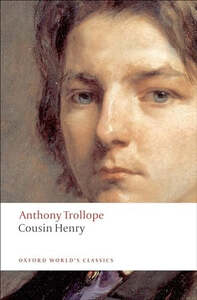
Cousin Henry (1880) is something of a rarity amongst Trollope’s novels in that it’s fairly short. Despite its brevity, it manages to include one of the most interesting character studies I’ve encountered in Victorian fiction. Henry Jones inherits his uncle’s estates and conceals the knowledge that another will had been made, this time leaving them to his cousin Isabel Brodrick. His guilty conscience means that he is unable to enjoy his new-found wealth and he becomes increasingly bitter and reclusive. The presence of the legal will torments him, but his weakness of character prevents him from destroying it.
As with many of his other novels, Trollope makes the outcome of the plot quite obvious at the outset. In Brechtian fashion, he doesn’t want his readers to be distracted by twists and turns, instead wishing them to focus on the characterisation and the issues he addresses. One of the main themes of the novel is the law of primogeniture, although it is used more to set up tensions between the two main characters, rather than to examine its inequities. Mary Elizabeth Braddon had already presented the woman’s perspective in her 1863 novel Eleanor’s Victory and Trollope appears to be influenced by her portrayal of a weak-willed man with a sense of entitlement who feels threatened by a strong, independent female relative. Trollope also revisits some of the themes of earlier novels in which women rebel against the idea of marriage to further familial interests, insisting instead on marrying for love.
The character study of Henry himself is particularly striking; although quite repellent, Trollope manages to elicit at least a little sympathy for him from the reader. It is unfortunate that the legal expert with whom he is threatened is given the name of Mr Cheekey, which really renders him far less minatory. Isabel Brodrick is a study in stubbornness, and as such the reader becomes less interested in the injustice she has suffered. This novel stands out amongst Trollope’s own work and also amongst the Victorian canon as a whole.
Cousin Henry by Anthony Trollope